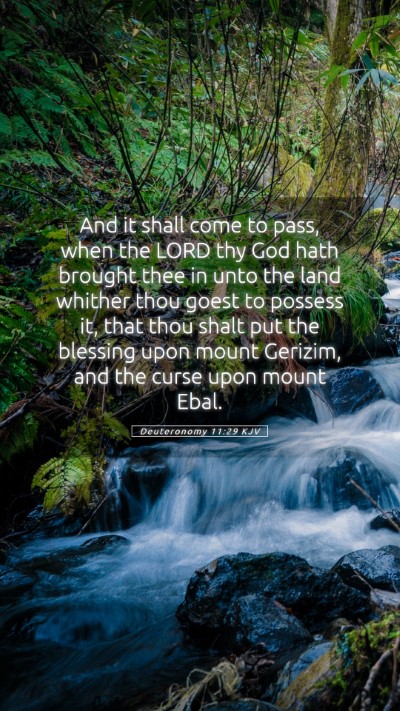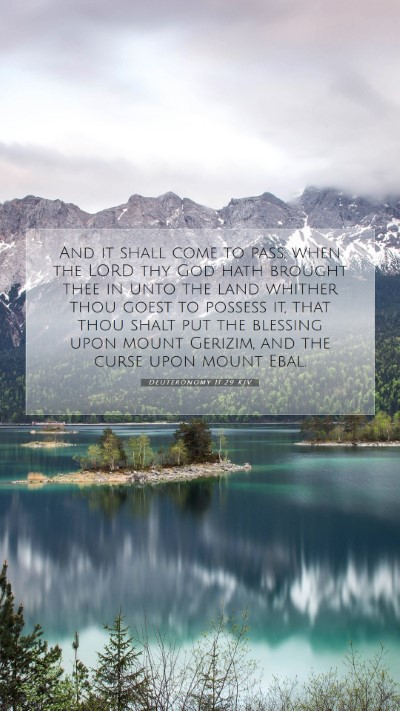Understanding Deuteronomy 11:29
Verse: "And it shall come to pass, when the Lord thy God hath brought thee in unto the land whither thou goest to possess it, that thou shalt put the blessing upon mount Gerizzim, and the curse upon mount Ebal." (Deuteronomy 11:29)
Bible Verse Explanations
This verse conveys instructions given to the Israelites on how to approach the promised land, emphasizing the importance of obedience to God and the duality of blessings and curses based on their actions.
Bible Verse Commentary
- Matthew Henry: Henry highlights the significance of the ceremony involving Mount Gerizzim and Mount Ebal, where blessings and curses were pronounced. This serves as a reminder of the covenant relationship between God and His people, where obedience brings blessings and disobedience, curses.
- Albert Barnes: Barnes points out the geographical importance of the two mountains, suggesting that their positioning symbolizes the choice between following God’s commandments and neglecting them. He notes that this ceremony was a crucial part of their entrance into Canaan, reinforcing the seriousness of their commitment to God.
- Adam Clarke: Clarke emphasizes the historical context of the event, elaborating on how the Israelites were to remember God's commandments and apply them in their new land. He stresses that the blessings and curses were not merely ceremonial but had real implications for the lives of the people.
Meaning of Bible Verses
The essential meaning of Deuteronomy 11:29 lies in the dual nature of choice presented to the Israelites. It illustrates the consequences of their decisions, signifying that faithfulness to God results in divine favor and prosperity, while turning away leads to dire repercussions.
Historical Context of Bible Verses
Understanding the historical context is vital for interpreting this verse. At this point in biblical history, the Israelites were on the brink of entering the land of Canaan, a land promised to them by God. The blessings pronounced from Mount Gerizzim and the curses from Mount Ebal are a public declaration of their commitment to God’s laws.
Application of Bible Verses to Daily Life
This verse speaks to the importance of making choices that align with God’s will. In modern applications, it serves as a reminder for believers to engage in self-examination regarding their actions and their alignment with biblical teachings, ensuring that they lead lives that reflect God’s blessings.
Related Bible Cross References
- Joshua 8:33-35: This passage recounts the fulfillment of the command to bless and curse from the mountains.
- Leviticus 26:3-13: Provides a detailed account of blessings for obedience to God’s commandments.
- Deuteronomy 30:19-20: Reinforces the choice between life and death, blessings and curses, urging the people to choose life.
Conclusion
Deuteronomy 11:29 serves as a profound reminder of the choices set before God's people and the importance of adhering to His commands. Understanding the implications of this verse contributes an essential element to Bible verse meanings and interpretations. The call to faithfulness and the acknowledgment of God’s authority resonate deeply in the hearts of believers today, encouraging continued exploration of Scripture.
Bible Study Insights
Engaging with passages like Deuteronomy 11:29 through Bible study groups or online resources enhances understanding and enriches one’s spiritual journey.
In-depth Bible Verse Analysis
For those seeking to delve deeper, this verse invites an examination of the broader narrative of Israel's journey and their covenant with God, making it a valuable topic for study lessons and guides.
Scripture Analysis
Each element within this verse demands careful consideration, making it an excellent candidate for a detailed study plan that encompasses both historical context and personal application.


